 It is 100 years since the Ottomans ruled the Middle East region, and today Israel is the single oasis of freedom in a bubbling regional mess. Anyone, who like I have, has grappled with the complex history of the Israel/Arab conflict, must have spent long periods attempting to unravel the events that were to bring about such suffering on both sides of the great divide. Like any journey in which the travellers become truly lost, there were many crossroads along the way, and some of the decisions made were to have a disastrous influence and carry long lasting irreversible consequences. The conflict as we know it today was not a forgone conclusion from the start, and given some strong and well-intended leadership, it could all have been very different. There have also been many ‘second chances’ , so these, in my opinion, are the 11 greatest mistakes made by the Arab leadership in and around Palestine.
It is 100 years since the Ottomans ruled the Middle East region, and today Israel is the single oasis of freedom in a bubbling regional mess. Anyone, who like I have, has grappled with the complex history of the Israel/Arab conflict, must have spent long periods attempting to unravel the events that were to bring about such suffering on both sides of the great divide. Like any journey in which the travellers become truly lost, there were many crossroads along the way, and some of the decisions made were to have a disastrous influence and carry long lasting irreversible consequences. The conflict as we know it today was not a forgone conclusion from the start, and given some strong and well-intended leadership, it could all have been very different. There have also been many ‘second chances’ , so these, in my opinion, are the 11 greatest mistakes made by the Arab leadership in and around Palestine.
(It should be pointed out that to describe in detail each of these greatest mistakes would take up a book or two of their own; it is an exercise perhaps worth undertaking, but one for another time)
1. The ‘decision’ to oppose Zionism. 1917-
 In the period between Balfour and the rise of major and persistent violence against the Jews living in Palestine, there was no concept of an Arab Palestinian leadership as we understand it today. There were Arabs, Muslim and Christian, whose families had lived in their villages or towns for hundreds of years, Arabs who were nomadic, Arabs who were migrating in search of new opportunity presented by Zionism, and other resident groups such as Druze. There was little concept of a national identity existing between that of the clan and that of the Greater Arab Nation. With such disunity and no democratic voice, ‘Palestinian will’ was in the hands of clan leaders, religious leaders, foreign Arab monarchs and the editorial slant of one or two local newspapers. In reality Arab Palestinian identity was the result of the opposition to the rise of Zionism, and as Israel began to emerge from the belly of the mandate, it was this opposition that finally gave birth to the Palestinian Arab. This is not to discard the ties many in this community had to a land their families may have resided in for 100’s of years, but to point out that the nationhood of Palestine is a result of Zionism. No Zionism = no Palestinians.
In the period between Balfour and the rise of major and persistent violence against the Jews living in Palestine, there was no concept of an Arab Palestinian leadership as we understand it today. There were Arabs, Muslim and Christian, whose families had lived in their villages or towns for hundreds of years, Arabs who were nomadic, Arabs who were migrating in search of new opportunity presented by Zionism, and other resident groups such as Druze. There was little concept of a national identity existing between that of the clan and that of the Greater Arab Nation. With such disunity and no democratic voice, ‘Palestinian will’ was in the hands of clan leaders, religious leaders, foreign Arab monarchs and the editorial slant of one or two local newspapers. In reality Arab Palestinian identity was the result of the opposition to the rise of Zionism, and as Israel began to emerge from the belly of the mandate, it was this opposition that finally gave birth to the Palestinian Arab. This is not to discard the ties many in this community had to a land their families may have resided in for 100’s of years, but to point out that the nationhood of Palestine is a result of Zionism. No Zionism = no Palestinians.
Although many Arab villages existed at peace with local Jewish villages, power struggles between competing clans sought to create friction on the ground, and with the additional help of religious leaders and Pan-Arabists, the violent struggle against Zionism began. This decision, one taken as part of regional power struggles and without taking into account the best interests of the residents, lit the fires that have been burning ever since. Sir Herbert Samuel, speaking to the editor of the newspaper Filastin (c1920) suggested that:
“You are indiscriminately spreading around any and all kinds of Zionist pronouncements. If you weren’t publishing these things, we wouldn’t have the tension that exists in the country,”
This was the primary mistake, ignoring the prosperity that was driving Arabs to migrate towards Zionist areas, denying the opportunity that progress brings, and instead listening to the dark forces that pointed to Zionism as the bringer of evil. The Jewish immigration into Palestine was an incredible opportunity for everyone, and the decision to oppose it was to prove the greatest mistake of them all.
2. The decision to oppose refugee immigration. 1930’s.
In terms of cost in human lives, this decision is theoretically the most damaging. Since Balfour, as the Jewish sectors in the area worked towards building an infrastructure, the Arab camp stagnated in protest. All talk of progress was opposed, all co-operation publicly shunned. It was the riots of 1929 that were to see the British begin to close the doors to Jewish immigration and 4 years later when Hitler came to power the trickle of Jews trying to escape to Palestine began to turn into a flood. Having learnt the equation from 1929 that Arab civil unrest brings British restrictions on Jews, the Arabs violently opposed giving refuge to those escaping Hitler’s grasp. It would be wrong to equate Jewish Zionist immigration from the 1920’s with Jewish refugee immigration from the late 1930’s, and difficult to underestimate the consequences of this Arab revolt, which was to bring about a total clamp down on Jews being allowed into Palestine. Ask yourself this: If Palestine, the internationally designated home of the Jewish people had opened its arms to the Jewish people fleeing Europe and in turn had advertised the fact Jews were welcome, even creating a pipeline to facilitate it, how many more innocent people would have escaped the Holocaust?
3. The decision to oppose Partition. 1947.
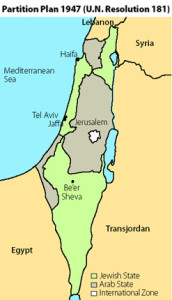 Having created the call for partition through ongoing and incessant violence, in November 1947, the Palestinians were given their first concrete opportunity to have an independent state. What was on offer was an independent Palestinian state containing far more than just the West Bank and Gaza, but they rejected it completely. Resolution 181 was accepted by the Jews, but swiftly condemned by the entire Arab nation who declared they would be forced to embark ‘on a war of elimination’ if partition were carried out. One day later, on November 30th 1947 there was violent Arab protest, Jewish passengers on a bus were murdered and the civil war had begun. Within 2 months, irregular Arab armies had entered Palestine and on the day of Israel’s declaration of independence, the first regional Israel/Arab conflict began when all of Israel’s neighbours attacked it. The initial chance for Palestinian independence had gone.
Having created the call for partition through ongoing and incessant violence, in November 1947, the Palestinians were given their first concrete opportunity to have an independent state. What was on offer was an independent Palestinian state containing far more than just the West Bank and Gaza, but they rejected it completely. Resolution 181 was accepted by the Jews, but swiftly condemned by the entire Arab nation who declared they would be forced to embark ‘on a war of elimination’ if partition were carried out. One day later, on November 30th 1947 there was violent Arab protest, Jewish passengers on a bus were murdered and the civil war had begun. Within 2 months, irregular Arab armies had entered Palestine and on the day of Israel’s declaration of independence, the first regional Israel/Arab conflict began when all of Israel’s neighbours attacked it. The initial chance for Palestinian independence had gone.
4. The decision to maintain refugees. 1948/1949
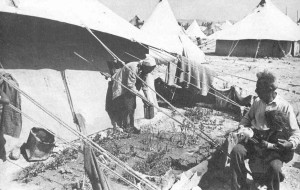 The war created a refugee problem. 100,000 Palestinians fled in the opening months of the civil war. Later, others fled to evade being caught in a conflict, some fled because Arabs forces told them to and in areas that were openly hostile, Israel most likely operated to remove the inhabitants. In terms of persistent human suffering, the decision regarding these refugees is by far the worst decision of them all, with grave consequences for millions of people and the perpetual stick that stops the wheels of time turning as they should. Throughout the later period of the 1948/49 war, through resolution 194 and onto the Lausanne Conference, deals were on the table to ease or end the refugee problem. Israel offered to take some refugees on condition the rest were absorbed by the Arab states (the entire Palestinian refugee crisis was only 1/5th the size of the current Syrian problem). Israel asked in turn for recognition. The deal collapsed.
The war created a refugee problem. 100,000 Palestinians fled in the opening months of the civil war. Later, others fled to evade being caught in a conflict, some fled because Arabs forces told them to and in areas that were openly hostile, Israel most likely operated to remove the inhabitants. In terms of persistent human suffering, the decision regarding these refugees is by far the worst decision of them all, with grave consequences for millions of people and the perpetual stick that stops the wheels of time turning as they should. Throughout the later period of the 1948/49 war, through resolution 194 and onto the Lausanne Conference, deals were on the table to ease or end the refugee problem. Israel offered to take some refugees on condition the rest were absorbed by the Arab states (the entire Palestinian refugee crisis was only 1/5th the size of the current Syrian problem). Israel asked in turn for recognition. The deal collapsed.
As an example, take the Gaza Plan; Israel offered to annex Gaza, absorbing not only its 70,000 Arab residents, but also 230,000 refugees for resettlement. Had this plan been accepted, Gaza would today be a part of a democratic state, the people of Gaza would know freedom and the Palestinian refugee crisis would never have begun. Gaza today is the result of Arab rejectionist policy. Rather than work towards a solution, UNWRA was created specifically to perpetuate a refugee issue, special definitions were created to grant inherited refugee status and the world’s most absurd refugee crisis had set sail. There was a conscious decision to leave a generation of people as pawns to be utilized by the Arab states as a powerful political and propaganda tool against Israel and 66 years later these peoples descendants are still paying the price for this decision.
5. The decision not to create a Palestinian state. 1949
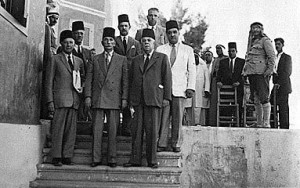 Gaza and the West Bank were entirely in Arab hands and with 700,000 Palestinian refugees in need of a permanent home, 1949 was the time for Palestinians to declare a state. Only it never happened. The self-serving Arab nations, assisted by self-serving Palestinians, carved up what was left of the British Mandate, with Jordan taking control of the West Bank and Egypt taking Gaza. With both Egypt and Jordan at loggerheads, Egypt set up a phony Palestinian government to take control of the Palestinian issue and declared an all or nothing policy over Palestine. Thus began another tragedy in the Palestinian leadership story; ordinary Palestinians had leaders imposed, not from within the camps, the West Bank or Gaza, but self-exiled rulers; living as princes, making decisions that would dictate the lives of all those left behind. It was a bond, that despite its self-defeating nature, would not be broken. Another chance for a Palestinian state had come and gone and the Palestinians were left under Arab rule and with an exiled leadership that enjoyed the comfort of kings and commanded by remote control.
Gaza and the West Bank were entirely in Arab hands and with 700,000 Palestinian refugees in need of a permanent home, 1949 was the time for Palestinians to declare a state. Only it never happened. The self-serving Arab nations, assisted by self-serving Palestinians, carved up what was left of the British Mandate, with Jordan taking control of the West Bank and Egypt taking Gaza. With both Egypt and Jordan at loggerheads, Egypt set up a phony Palestinian government to take control of the Palestinian issue and declared an all or nothing policy over Palestine. Thus began another tragedy in the Palestinian leadership story; ordinary Palestinians had leaders imposed, not from within the camps, the West Bank or Gaza, but self-exiled rulers; living as princes, making decisions that would dictate the lives of all those left behind. It was a bond, that despite its self-defeating nature, would not be broken. Another chance for a Palestinian state had come and gone and the Palestinians were left under Arab rule and with an exiled leadership that enjoyed the comfort of kings and commanded by remote control.
6. The decision to listen to Tunis 1988-1993
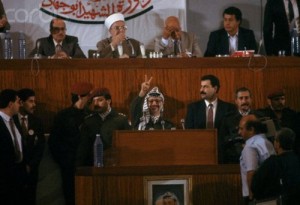 For 40 years, the Palestinians in Gaza and the West Bank had developed an identity and experience of their own and in 1987, the intifada exploded across the Palestinian areas. The PLO that had brought so much destruction in Jordan and Lebanon, were caught completely by surprise, sitting impotently as they were, in their latest refuge in Tunis. On the one side a people who were suffering and crying out for leadership, on the other, Arafat; self-serving, self-appointed, royalty. The PLO had been left redundant and had been outplayed by the Palestinian people; as a response the PLO attempted to regain authority by declaring Palestinian independence with Arafat declaring himself President. As external events such as the Gulf War, created a ‘window of opportunity,’ so too they brought local community leaders in Palestinian cities the opportunity to speak out for themselves. Instead, following Madrid, the Palestinian voice of the Intifada was lost and Arafat was brought in from the cold; seeing a population now capable of conducting negotiations for themselves, kneeling down to a leadership that was impotent, distant and sought only to maintain the lifestyle of kings.
For 40 years, the Palestinians in Gaza and the West Bank had developed an identity and experience of their own and in 1987, the intifada exploded across the Palestinian areas. The PLO that had brought so much destruction in Jordan and Lebanon, were caught completely by surprise, sitting impotently as they were, in their latest refuge in Tunis. On the one side a people who were suffering and crying out for leadership, on the other, Arafat; self-serving, self-appointed, royalty. The PLO had been left redundant and had been outplayed by the Palestinian people; as a response the PLO attempted to regain authority by declaring Palestinian independence with Arafat declaring himself President. As external events such as the Gulf War, created a ‘window of opportunity,’ so too they brought local community leaders in Palestinian cities the opportunity to speak out for themselves. Instead, following Madrid, the Palestinian voice of the Intifada was lost and Arafat was brought in from the cold; seeing a population now capable of conducting negotiations for themselves, kneeling down to a leadership that was impotent, distant and sought only to maintain the lifestyle of kings.
7. The decision to use Hamas. 1993 –
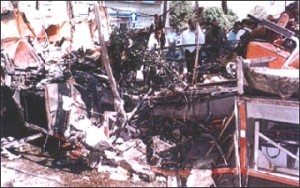 Oslo was to see yet another opportunity for the creation of a Palestinian state through direct negotiations between Israel and the Palestinian leadership. The weaknesses in the Oslo process were many and although neither side stuck to the script, the process had momentum and the situation for Palestinians in the areas improved. By the late 1990’s most Palestinian cities were flourishing. However, negotiations were tough and the Palestinians were not visibly willing to engage serious discussion over the more complex issues, constantly asking for more and giving very little of substance. Whether Arafat ever truly regained the Palestinian street is a subject for debate, but it is clear he felt Hamas violence could be used as a bargaining chip when negotiations stalled, rather than as something to be absolutely opposed. The suicide bombings of the 1990’s were to have a devastating impact on the Israeli psyche, one that would eventually see the left wing block entirely implode. With Israelis sensing that Arafat was ‘green-lighting’ Hamas attacks and saying one thing in Arabic and another in English, as Israeli casualties mounted, Israeli support for Oslo fell apart.
Oslo was to see yet another opportunity for the creation of a Palestinian state through direct negotiations between Israel and the Palestinian leadership. The weaknesses in the Oslo process were many and although neither side stuck to the script, the process had momentum and the situation for Palestinians in the areas improved. By the late 1990’s most Palestinian cities were flourishing. However, negotiations were tough and the Palestinians were not visibly willing to engage serious discussion over the more complex issues, constantly asking for more and giving very little of substance. Whether Arafat ever truly regained the Palestinian street is a subject for debate, but it is clear he felt Hamas violence could be used as a bargaining chip when negotiations stalled, rather than as something to be absolutely opposed. The suicide bombings of the 1990’s were to have a devastating impact on the Israeli psyche, one that would eventually see the left wing block entirely implode. With Israelis sensing that Arafat was ‘green-lighting’ Hamas attacks and saying one thing in Arabic and another in English, as Israeli casualties mounted, Israeli support for Oslo fell apart.
8. The decision to reject Oslo. 1999-2000
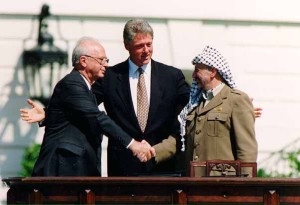 The bottom line in any meaningful peace deal between the Israelis and the Palestinians is a straightforward two state solution; one for Israelis, the other for Palestinians. All of the logistics surrounding this premise, such as settlements, water, Jerusalem, are of a secondary nature, and given a real intent on the part of both parties to find a solution, these details would not stop interim agreements being set in place. The issue above all others that creates an environment of impossible dreams is the Palestinian refugee problem. Arafat could probably have sold the Palestinian people a deal that would allow for him to declare parts of East Jerusalem a Palestinian capital, to engage in land swaps that would allow for Israel to maintain the largest settlements and perhaps slowly, a non-conflict status could have arisen between the Arabs and the Jews. This entire scenario has no meaning unless Arafat or any Palestinian leader can survive telling the millions of refugees sitting in camps outside of the areas that they have been used; an open declaration that there is no return for the refugees in a two state solution. This basic problem, actual, concrete acceptance of a two state solution, has been beyond every public announcement by every Palestinian leader. Palestinian leaders talk of two states but ask also for the right of return into Israel. As Arafat was offered deals that he should have accepted, it was this issue above all others that probably led to the collapse of Olso.
The bottom line in any meaningful peace deal between the Israelis and the Palestinians is a straightforward two state solution; one for Israelis, the other for Palestinians. All of the logistics surrounding this premise, such as settlements, water, Jerusalem, are of a secondary nature, and given a real intent on the part of both parties to find a solution, these details would not stop interim agreements being set in place. The issue above all others that creates an environment of impossible dreams is the Palestinian refugee problem. Arafat could probably have sold the Palestinian people a deal that would allow for him to declare parts of East Jerusalem a Palestinian capital, to engage in land swaps that would allow for Israel to maintain the largest settlements and perhaps slowly, a non-conflict status could have arisen between the Arabs and the Jews. This entire scenario has no meaning unless Arafat or any Palestinian leader can survive telling the millions of refugees sitting in camps outside of the areas that they have been used; an open declaration that there is no return for the refugees in a two state solution. This basic problem, actual, concrete acceptance of a two state solution, has been beyond every public announcement by every Palestinian leader. Palestinian leaders talk of two states but ask also for the right of return into Israel. As Arafat was offered deals that he should have accepted, it was this issue above all others that probably led to the collapse of Olso.
9. The decision to create a 2nd Intifada. 2000
 Intifada 1 was a near spontaneous event that caught the external Palestinian leadership by surprise; Intifada 2 was nothing of the sort. As Arafat was caught in a corner being unable to accept or negotiate around a relatively decent deal, he chose the route that came most natural to him; he turned to violence. Intifada 2 exploded in unprecedented terror and Oslo crumbled. The left wing, or ‘peace camp’ in Israel felt absolutely betrayed and 15 years later, has yet to regain any semblance of order. The premise that the Palestinian leadership wanted to work towards a two state solution had been literally blown apart; using Sharon’s visit to Temple Mount as a feeble excuse, the Palestinians had clearly been preparing for a fight. They were armed, they were organised and they were ready. This decision to green light the violence is the primary cause of the last 15 years of absolute stagnation. Israelis feel they gave the Palestinians the opportunity to gain independence and received deception, delaying tactics and bus bombings in return. Intifada 2 was the result of the Palestinian leadership being unable to accept a true two state solution; it was a deliberate tactic and a decision that was to lead to incredible loss of life on both sides.
Intifada 1 was a near spontaneous event that caught the external Palestinian leadership by surprise; Intifada 2 was nothing of the sort. As Arafat was caught in a corner being unable to accept or negotiate around a relatively decent deal, he chose the route that came most natural to him; he turned to violence. Intifada 2 exploded in unprecedented terror and Oslo crumbled. The left wing, or ‘peace camp’ in Israel felt absolutely betrayed and 15 years later, has yet to regain any semblance of order. The premise that the Palestinian leadership wanted to work towards a two state solution had been literally blown apart; using Sharon’s visit to Temple Mount as a feeble excuse, the Palestinians had clearly been preparing for a fight. They were armed, they were organised and they were ready. This decision to green light the violence is the primary cause of the last 15 years of absolute stagnation. Israelis feel they gave the Palestinians the opportunity to gain independence and received deception, delaying tactics and bus bombings in return. Intifada 2 was the result of the Palestinian leadership being unable to accept a true two state solution; it was a deliberate tactic and a decision that was to lead to incredible loss of life on both sides.
10. The decision to turn Gaza into a terror enclave. 2005/6
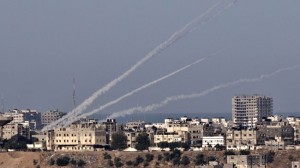 In 2005, Ariel Sharon led Israel’s disengagement from Gaza. Israel pulled out of the Gaza Strip entirely and dismantled all the Israeli settlements in the Strip. The move was universally applauded, with the Palestinian president suggesting it was a ‘historic and joyful day’. The intention was to allow the Palestinians self-governance, borders, a port and an airport, with Palestinians having complete control over exits and entrances to their territory. It wasn’t perfect, but it was certainly an opportunity for a decent start. Within days rockets had been fired against Israel and within months, the Palestinians had voted for Hamas, who then proceeded to turn Gaza into it’s HQ, killing Fatah representatives in a bloody civil war. What had been a golden opportunity to prove that peace was an option, the Palestinian leadership had turned into a stronghold of terror. Sanctions were placed on the Strip by the Quartet in response to Hamas declarations and another violent downward spiral had begun. What should have, and could have been a free Palestinian area is now the Gaza that we see on our TV screens.
In 2005, Ariel Sharon led Israel’s disengagement from Gaza. Israel pulled out of the Gaza Strip entirely and dismantled all the Israeli settlements in the Strip. The move was universally applauded, with the Palestinian president suggesting it was a ‘historic and joyful day’. The intention was to allow the Palestinians self-governance, borders, a port and an airport, with Palestinians having complete control over exits and entrances to their territory. It wasn’t perfect, but it was certainly an opportunity for a decent start. Within days rockets had been fired against Israel and within months, the Palestinians had voted for Hamas, who then proceeded to turn Gaza into it’s HQ, killing Fatah representatives in a bloody civil war. What had been a golden opportunity to prove that peace was an option, the Palestinian leadership had turned into a stronghold of terror. Sanctions were placed on the Strip by the Quartet in response to Hamas declarations and another violent downward spiral had begun. What should have, and could have been a free Palestinian area is now the Gaza that we see on our TV screens.
11. The decision to call for BDS. 2005-
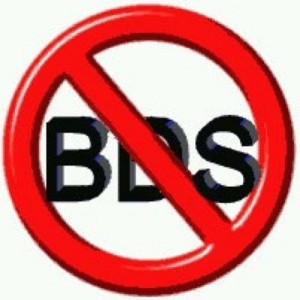 When the impossible scenario had forced the 2nd intifada and the intifada had failed to do anything but drive the Palestinians further into the desert sand, Palestinian leaders were again faced with a strategic choice; what now? Whilst an unnacceptable deal is so close, there was no returning to a peace table for negotiations. There was also little fight left in the Palestinians in the territories, so a return to the original position was called for; “Palestine, Palestine, will be free, from the river to the sea.” The Boycott, the slow burning attempt to strangle Israel into submission; yet another strategy that uses the current generation of Palestinians as human shields. BDS is nothing to do with peace and the BDS movement simply seeks to continue the policy of the last 100 years; the all or nothing approach. Today’s generation isn’t important, nor is tomorrow’s and the Palestinian suffering is a price that must be paid. The Palestinian leadership once again delegated responsibility to groups that do not have the best interests of the Palestinians at heart. Even as Palestinians themselves do not fully support a strategy of boycott, people in the international arena push BDS as being the best thing for the Palestinians. It is the same old story over and over again; for 100 years, Palestinians have stagnated as Israel has grown strong and people outside of Palestine have directed the conflict from afar. Rather than accept Israel’s presence Palestinian leaders have chosen to ignore every offer on the table because every offer includes an acceptance of Israel. Whilst society may have become so fake, so full of puff, that the truth actually bothers people, it is, as it always was, up to the Palestinians to finally find amongst themselves a leader. One who is strong enough and brave enough to tell them the truth, face the realities and finally dig them out of the sand.
When the impossible scenario had forced the 2nd intifada and the intifada had failed to do anything but drive the Palestinians further into the desert sand, Palestinian leaders were again faced with a strategic choice; what now? Whilst an unnacceptable deal is so close, there was no returning to a peace table for negotiations. There was also little fight left in the Palestinians in the territories, so a return to the original position was called for; “Palestine, Palestine, will be free, from the river to the sea.” The Boycott, the slow burning attempt to strangle Israel into submission; yet another strategy that uses the current generation of Palestinians as human shields. BDS is nothing to do with peace and the BDS movement simply seeks to continue the policy of the last 100 years; the all or nothing approach. Today’s generation isn’t important, nor is tomorrow’s and the Palestinian suffering is a price that must be paid. The Palestinian leadership once again delegated responsibility to groups that do not have the best interests of the Palestinians at heart. Even as Palestinians themselves do not fully support a strategy of boycott, people in the international arena push BDS as being the best thing for the Palestinians. It is the same old story over and over again; for 100 years, Palestinians have stagnated as Israel has grown strong and people outside of Palestine have directed the conflict from afar. Rather than accept Israel’s presence Palestinian leaders have chosen to ignore every offer on the table because every offer includes an acceptance of Israel. Whilst society may have become so fake, so full of puff, that the truth actually bothers people, it is, as it always was, up to the Palestinians to finally find amongst themselves a leader. One who is strong enough and brave enough to tell them the truth, face the realities and finally dig them out of the sand.
Please like the FB page for this blog: and follow me on Twitter


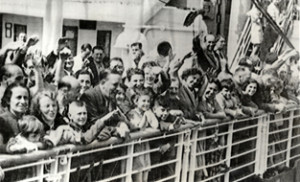
But of course, it’s only “mismanagement” if you assume their mission statement is Statehood and peace. If their mission statement is “reconquer the Jews by any means, no matter how many lives we destroy” then their leadership is doing a top-notch job of steering the ship in accordance with their goals.